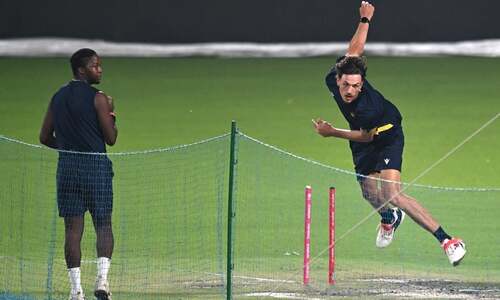ISLAMABAD, June 28: The federal government on Thursday placed the entire material relating to the reference against Chief Justice Iftikhar Mohammad Chaudhry before the Supreme Court and assured the bench that it would not object if the full court adjudged the reference.
“I am under instructions from the highest level to place the material before the Supreme Court,” Advocate Malik Mohammad Qayyum, representing the federal government, told the 13-member larger bench hearing the chief justice’s petition challenging the presidential reference filed against him.
Concluding his arguments on Wednesday, Barrister Aitzaz Ahsan, the lead counsel for the chief justice, had said the Supreme Court had three options before it: to decide that no reference could be filed against the chief justice under Article 209 of the Constitution; the reference should be heard by the Supreme Judicial Council presided over by the chief justice himself; or the full court comprising all judges of the apex court should decide the reference.
On Thursday, Mr Qayyum said the federation and the president had full faith in the judiciary and the Supreme Court and would accept its verdict.
He told reporters after the hearing that all documents relating to the reference had been filed in the Supreme Court and the government was considering moving an application requesting the full court to take up the reference.
“But filing of the material or the application does not mean that the government is withdrawing the reference from the SJC or submitting a new reference. Rather, the same reference is coming before the full court,” Mr Qayyum explained.
Justice Khalilur Rehman Ramday, who heads the larger bench, observed that there was a catch inherent in the statement made by the government lawyer, explaining that if the full court took up the reference, the entire situation would revert back to that of March 9 when there was no restraining order against the chief justice, no reference had been filed against the CJ and he had not been sent on forced leave.
In a lighter vein, Justice Ramday also observed that if the full court started hearing the reference, after a few months family members of judges would be standing outside the Supreme Court with banners demanding whereabouts of the judges. “This offer should have come three months ago.”
Justice Faqir Mohammad Khokhar said the court had first to consider how it could replace the SJC, adding that the government should extend this offer to the petitioner’s side. The court also had to determine its jurisdiction to hear the reference, he said.
Mr Qayyum referred to objections raised by the petitioner on the composition of the SJC and his counsel’s insistence that a reference could not be filed against the chief justice and asked where should the government go. “We want the matter (reference) to be investigated. Let there be a clean slate,” he said.
Even if the entire composition of the council comprising five judges was changed, the government would have no objection, Mr Qayyum added.
Justice Faqir Khokhar said the petitioner’s side had objected to the presence of three judges for being biased.
“If we accept their contention that judges who are the ultimate beneficiary in the removal of the CJ should not sit in the SJC, then Acting Chief Justice Rana Bhagwandas would also be one of the beneficiaries and should not preside (over) the council,” Mr Qayyum said.
At the outset of the hearing, Justice Mohammad Nawaz Abbasi criticised a statement of Mr Ahsan during his concluding arguments that except two, none of the judges should have read affidavits of the Chief of Staff to the President, Lt-Gen (retd) Hamid Javed, and heads of Military Intelligence, Inter-Services Intelligence and the Intelligence Bureau.
“My conscience is clear and not dead, and nobody can challenge our independence,” Justice Abbasi observed. He said the issue of lunch was being unnecessarily highlighted.
He said Article 209 dealt with accountability of all judges of the superior courts, including the chief justice, and no one enjoyed immunity.
Referring to constitutions of 21 countries, he said none of these had separate provisions for accountability of the chief justice, adding that there was no difference between a judge and the CJ and they were equally accountable.
He said that although the chief justice could not be removed from his office, sending him on leave did not mean his removal.
He said the chief justice was only a member of the SJC and he was replaceable because he did not sit as the CJ in the council, but as a member. There is also no prescribed procedure for presiding over the SJC and any member of the council can preside over it with consensus of other members.
He said the council’s code of conduct also did not mention the chief justice, but it treated him as a member of the council. He argued that if Article 209 was not applicable for accountability of the chief justice, the National Accountability Bureau ordinance would be applied on him.
The bench directed the media to be careful while mentioning that affidavits by the government side had been rejected by the court.




























